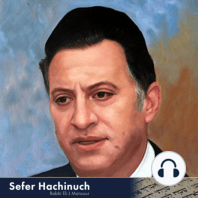20 min listen
Misva #414: Not to Appoint Incompetent Judges
FromSefer Hachinuch
ratings:
Length:
20 minutes
Released:
Mar 14, 2023
Format:
Podcast episode
Description
The Torah commands in Parashat Debarim (1:17), “Lo Takiru Panim Ba’mishpat” (literally, “Do not show favoritism in judgment”), which the Sages understood as a prohibition against appointing judges who lack the necessary credentials. Quite obviously, a judge who lacks proficiency in Torah law is prone to ruling incorrectly, and will at times acquit a guilty defendant and convict an innocent defendant. The Torah therefore forbids appointing as judge somebody who does not have the knowledge and expertise necessary to judge competently. The Sefer Ha’hinuch adds that those appointed as judges must also be men of fine character. Otherwise, the litigant whom a judge rules against will reject the legitimacy of the verdict, charging that the judge is himself guilty of crimes, and thus has no right to decide other people’s innocence or guilt. This requirement is inferred from Moshe’s instruction to select judges who were “Yedu’im Le’shibtechem” (1:13) – “known to your tribes,” referring to men with an upstanding reputation, who are known to have good character traits and are well-respected. Judges must also be “Ansheh Hayil” (Shemot 18:21) – “men of strength.” This refers to meticulousness in Misva observance, and the discipline to suppress one’s evil inclination, as the Mishna in Pirkeh Abot (4:1) famously teaches, “Who is strong? He who restrains his inclination.” Additionally, judges must have the courage to issue correct verdicts that will arouse anger and hostility, such as ruling in favor of the lowly and oppressed against the rich and powerful people who try to abuse them. An example of this strength and courage is Moshe Rabbenu, who fearlessly intervened to rescue Yitro’s daughters from the shepherds who tried taking advantage of them (“Va’yakam Moshe Va’yoshi’an” – Shemot 2:17). Moreover, the Sefer Ha’hinuch writes, judges must be men of genuine humility, just as Moshe was exceedingly humble. This prohibition applies in all times and places. If a person appoints a judge who is not qualified, such as if he was wealthy and influential, or out of nepotism, then he has transgressed this prohibition. The Rambam, in Hilchot Sanhedrin (19:4), implies that one who violates this command is not liable to Malkut. One reason is that it would be very difficult to prove one’s guilt in this regard, as he could always claim that he made an innocent mistake, wrongly assuming that the person he appointed was worthy of the position. Additionally, this prohibition is not transgressed by committing an action, and Malkut are administered only when one violates a Biblical prohibition by committing a forbidden act. Nevertheless, the Sefer Ha’hinuch warns that the violator will be severely punished, because he bears responsibility for every erroneous ruling issued by the incompetent judge whom he had appointed. The Sefer Ha’hinuch adds that just as the Torah forbids appointing unqualified judges, we must ensure that all positions of public service are filled by competent, worthy individuals. A person named to any leadership post, such as synagogue president, board member, and the like, must be someone with an upstanding reputation, respected for his integrity and fine character, and strong enough to take correct positions even if they will be resented and opposed by powerful people.
Released:
Mar 14, 2023
Format:
Podcast episode
Titles in the series (100)
Misva #8: Leaving Over Meat of the Korban Pesach: Daily Sefer Hachinuch - Brought to you by itorah.com by Sefer Hachinuch
